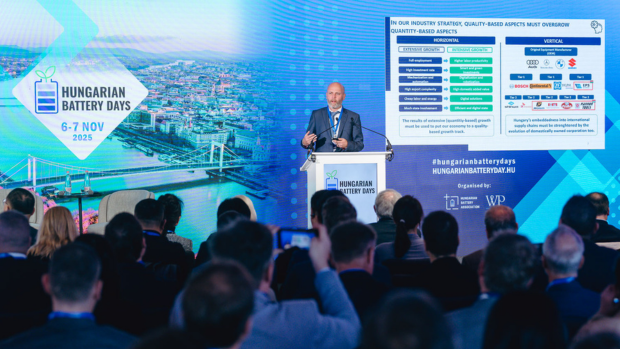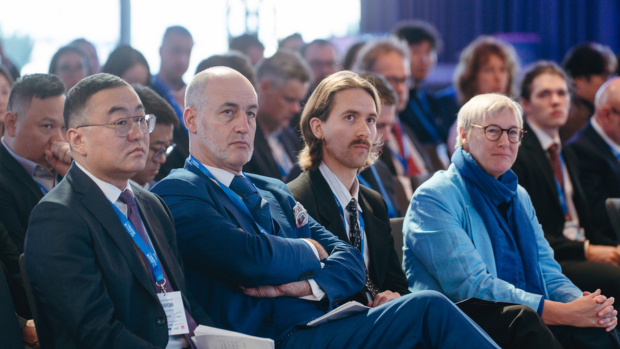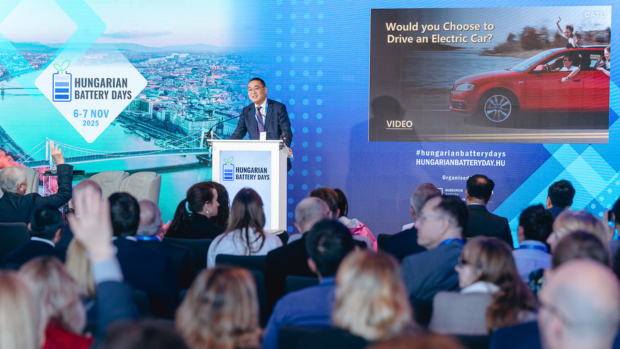The 5th Hungarian Battery Days, co-organised by the Hungarian Battery Association (HUBA) and White Paper Consulting, once again brought together the key players of the European and global battery industry. The two-day event welcomed 300 participants from 200 companies and 20 countries, including policymakers, investors, researchers, and leading representatives of the battery and e-mobility sectors.

© White Paper Consulting
The event was opened by Péter Kaderják, Executive Director of the Hungarian Battery Association (HUBA), who emphasised that “Europe has experienced a remarkable recovery on its EV market: in the first half of the year European EV sales grew by 25 per cent” At the same time, he also pointed out that the continent’s “position is weaker than it could be in the global competition” and that “environmental concerns, regulatory uncertainties, and high energy prices remain major issues.”
Hungary aims to respond to these challenges through economic policy and investments in the sector. The country’s goal is to “assume a bridge role in the fusion of Western and Eastern automotive knowledge and technology,” said Dr Ádám Nagy, Deputy State Secretary for Industrial Affairs, who also noted that “it’s quite certain that Hungary will be among the top three in the European Union in battery capacity.”
Dr Rita Szép-Tüske, Deputy CEO of the Hungarian Investment Promotion Agency (HIPA), gave an overview of the country’s investments in battery and e-mobility manufacturing. As she highlighted, five of the ten largest battery cell manufacturers are already present in Hungary, but HIPA aims to support the whole battery ecosystem and involve Hungarian suppliers in it as much as possible.
Looking at global trends, we are gradually arriving “to the age of electricity,” according to a presentation by Oskaras Alšauskas, Energy Analyst at the International Energy Agency (IEA). IEA forecasts that EV battery demand is set to triple by 2030. Oskaras Alšauskas also emphasised that to achieve climate targets, storage capacity needs to rise sixfold by 2030, with batteries making up 90 per cent of the growth. Meanwhile, Europe’s most important task would be to kickstart the industry and quickly develop a joint vision at the European level, said Ilka von Dalwigk, CEO of the industry association RECHARGE, who also outlined the organization’s various regulatory proposals on financial support, scale, scope, speed and sustainability.
When it comes to battery production, little is usually said about manufacturing equipment. This gap was filled by Peter Auerbeck, GROB-WERKE’s E-Mobility Key-Account Manager, who spoke about that when it comes to manufacturing, reducing the scrap rate with stable processes is one of Europe’s main challenges. He also noted that European battery machinery manufacturing is already competitive in many segments, yet there is still much to learn, just as Chinese companies once had to master automotive production.

© White Paper Consulting

© White Paper Consulting
Chinese battery manufacturer CATL is building its second and largest European battery factory in Debrecen, eastern Hungary, which will supply batteries to Mercedes‑Benz, BMW, Stellantis and Volkswagen, among others. In this context, Shen Feng, managing director of CATL Hungary and Germany, said that CATL is localising its operations to meet European standards and needs and aims to embed itself fully within the European ecosystem.
However, batteries are playing an increasingly important role not only in transportation but also in energy storage. Ábel Suri, Solution Director at Huawei, and Péter Horváth, CEO of Dunamenti Erőmű (MET Group), shared their experiences on this topic. Ábel Suri focused on grid security, emphasising that “the challenge is to harmonise traditional synchronous generation with inverter-based renewable generation, which operate on fundamentally different principles.” Péter Horváth explored domestic investment opportunities, and said that they are establishing local aggregator platforms that are able to deal with the complexity of handling the many types of technologies that provide flexibility but are challenging to monetise on the electricity markets.
In the discussion on the battery energy storage market development in Hungary, local industry participants regarded Hungary’s previous state support schemes as mostly successful in this area. Looking ahead, however, they mostly emphasised the need for stable, predictable regulation and the introduction of time-of-use pricing for residential users.
Recycling and sustainability were also in focus. Anita Simon, Deputy CEO for Sustainability and Circular Economy at Alteo, highlighted the importance of circular economy principles, stressing that strategic planning is essential to reduce the gap with China’s recycling sector, which is already far more mature than what we currently have in Europe. “The industry needs a clear vision in recycling as well, – and a mindset shift.”
Olaf Rogge, Business Development Manager for Recycling at BASF Battery Materials, noted Hungary’s strategic location and strong industrial ecosystem, but added a pointed remark to regulators: “Hungary is not the easiest country to do FDI in battery recycling.”
Daniel Bobanovic, Director of Business Operations at Croatia’s Jedro DS Innovations, explained their project to develop a battery-grade lithium hydroxide monohydrate plant in Gospić, Croatia, with a planned capacity of 25,000 tonnes per annum. César Jil Silva, Director of Global Process Technology at LevertonHELM talked about the company’s multipurpose plants that produce different lithium specialty compounds.
Aleksandar Džombić, CEO and Chairman of CROSTORION, speaking at the roundtable on recycling challenges, highlighted that people are afraid, and even policymakers often lack a clear understanding of the battery industry, which leads to automatic opposition. It is important to help the public understand how the industry actually works.
A key highlight of the day was the launch of the Hungarian Battery Excellence Award, presented for the first time by HUBA to INFOWARE, recognising outstanding Hungarian professional achievement and innovation within the industry.
The conference continued on 7 November with an exclusive site visit to Jász-Plasztik, Hungary’s largest domestically owned battery manufacturing and recycling company, providing participants with firsthand insight into advanced production and recycling technologies.
Related contents
Discuss



